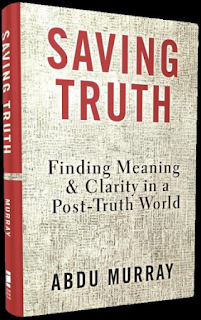"Fake News" & "Fake Theology"
I have no idea how I managed to get into the good graces of
Pastor Tony Mansinho who pastors Calvary Apostolic Church in Pittsburgh,
PA. In about a five-month period, he has
sent me more than 50 books that have been of excellent quality and not just
fillers for a bookshelf. He has also shared
several pics of his personal library and it is composed of a wide range theological
works that I am confident would be stimulating to any pastor-theologian. One of the books that he sent me was by Abdu
Murray, Saving Truth: Finding Meaning & Clarity in a Post-TruthWorld, published by Zondervan. I was
not familiar with this author but once I started reading, the compelling nature
of it did not allow it to be easily put down.
As I read, highlighted and made marginal notes, my mind began to run
down the proverbial rabbit trail.
Murray spends time developing and proving the fact that the
American church has lost its ability to think critically which in turn has
greatly affected her ability to discern.
Furthermore, we are not only living in a post-modern generation but a
post-truth world. “Post-truth” was the
2016 Word of the Year which was selected by Oxford Dictionaries. It means “relating or denoting circumstances
in which objective facts are less influential in shaping public opinion than
appeals to emotion and personal belief.”
Murray notes that this word actually had its origin in 1992 but by 2016
the usage of this word had ballooned 2000 percent. He then made the connection to the last
presidential election in 2016 and how that “fake news” ramped up a very
emotionally charged run for the White House that resulted in what very few
thought could happen. The facts were
dismissed for the sake of the personal agendas touted by politicians and their
party affiliations. Murry points out
that this is the spirit of the age. It
has created a horrible atmosphere for our country that I do not recall ever having
been present.
One of the more remarkable things that Murray brought to the
table was the matter of how we gather
information in our world. Instead of
pursuing what is the truth, too many
are pursuing what they want to be the
truth. He quoted Stephen Marche, who
wrote an op-ed for the Los Angeles Times,
who said that many Americans are getting news from sources that are at best lacking
credibility and at worst are sinisterly dark in trying to form what people
believe. He states that comedy and
satire shows like The Daily Show, Last Week Tonight, and Full Frontal with Samantha Bee, are
shaping the beliefs of viewers who have become so lazy with their thinking that
they are selling their minds to pied pipers who are leading them to their own
destruction.
As I read, highlighted, and scribbled in the margins of this
book, my mind took a turn toward theological and doctrinal trends of our
day. Here is the question that I wrote
to myself at the bottom of page 17: The greater question being; are preachers
falling into that trap? What suspect
sources do I use that might obscure the real truth? Those are sobering questions and they really
need to be answered! Murray also gave
attention to all of social media platforms that have given every person with an
itch to scratch a platform by which to scratch it. He summed it up by saying that when our
feelings get in the way of the facts, far too often we go with our
feelings. Curiously this matter can be
very destructive to Pentecostals who believe in the active work of the Spirit
(and I do believe this) and at the same time, much of what is passed off as the
“work” of the Spirit in our day can be highly subjective in nature. It is crucial that we find the objective
unchanging Word of God to be the absolute centerpiece of our thinking and of
ministry practice in the 21st century church. So, if Murray observed that You Tubers could have
huge followings with little regard to the truth and effect “fake news,” I
wondered how much “fake theology” is floating around in our day? That is a provoking question that made for
some more written thoughts in my journal.
I will share some of those matters that came to light over the next few
days.
I wondered what could contribute to “fake theology” in my
own work in the church. One of the greatest
contributors to that would be my American mind.
Very subtly but very effectively the devil (which far too many have
dismissed in our world) has sown tares among the wheat in such a way that the
pursuit of the American dream has somehow gotten woven into our ideas of how
the kingdom of God should advance. We
have become incredibly tolerant of every little doctrinal inclination that
would soften the hard truths displayed in Scripture. When we are willing to call everything “Christian”
even though it is in direct opposition to Scripture we are buying into the
whole deception that is “fake theology.”
Recently, someone questioned me about the so-called “Light Doctrine”
(aka Holy, Righteous, Wicked; Friends of the Bridegroom) which basically
expresses an alternative to New Testament salvation for those who “haven’t heard
the gospel” or for those who “are walking in all the light they know.” There are those who would declare those people
as “innocent” in their sin except for the Roman letter which Paul was quick to
determine that “all have sinned” (Rom. 3:23).
He had previously very strongly set up the gospel parameters in Romans
3:10-19 that pretty well sums up the condition of all mankind. I also had to consider what Jesus had said at
the end of His Sermon on the Mount in Matthew 7 when he said that those who hear
and do the sayings of his would be like a man who built his house on the rock
and he withstood the storm. Those who
did not hear and do his sayings were like fools who built on the sand and great
was the fall of their house. I then
followed that line of reasoning with John 3 where the command was given that we
must be born again. If you keep the
sayings of the Lord, you will build your house on a solid foundation but if
not, the sands will wash away and people will be lost.
Truth is unchanging but when we let the American consumer
mentality of choice move into our doctrinal positions, theology becomes “fake”
and will be filled with partial truths, doubt, apathy, and intellectual dishonesty. Theology is not fake will be that which is
filled with knowledge, truth, error, life, death, light and darkness. At the core of “fake theology” are roots of
idolatry which exalts itself against the truth of God’s Word. Anytime that a church service becomes about
man instead of God, emotions, feelings and personal experience muddles the
whole matter of true worship. I am
concerned that preaching at large has become nothing more than glorified pep
rallies to help us get through the little bumps and scrapes of our little
lives. Therefore, I have to ask myself another
question: Do the Scriptures stipulate
for me what is the substance of God-honoring and Christian preaching that flows
against “fake theology?” I know the Scriptures set up that for us and
over the next few days, I hope to get to the root of what causes the departure from God-exalting truth that is where “fake
theology” has its genesis.
Thanks for Reading. . .
Philip Harrelson






Comments